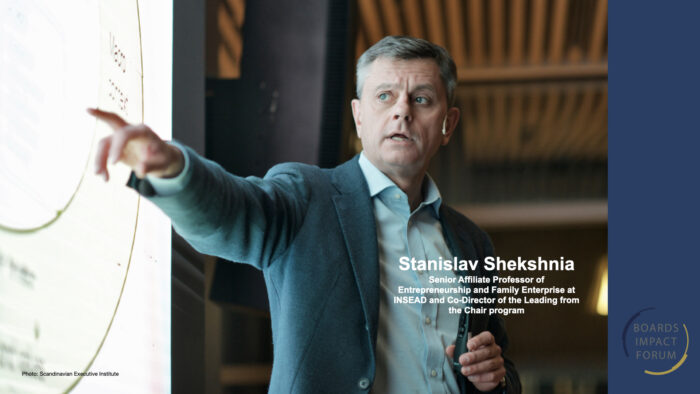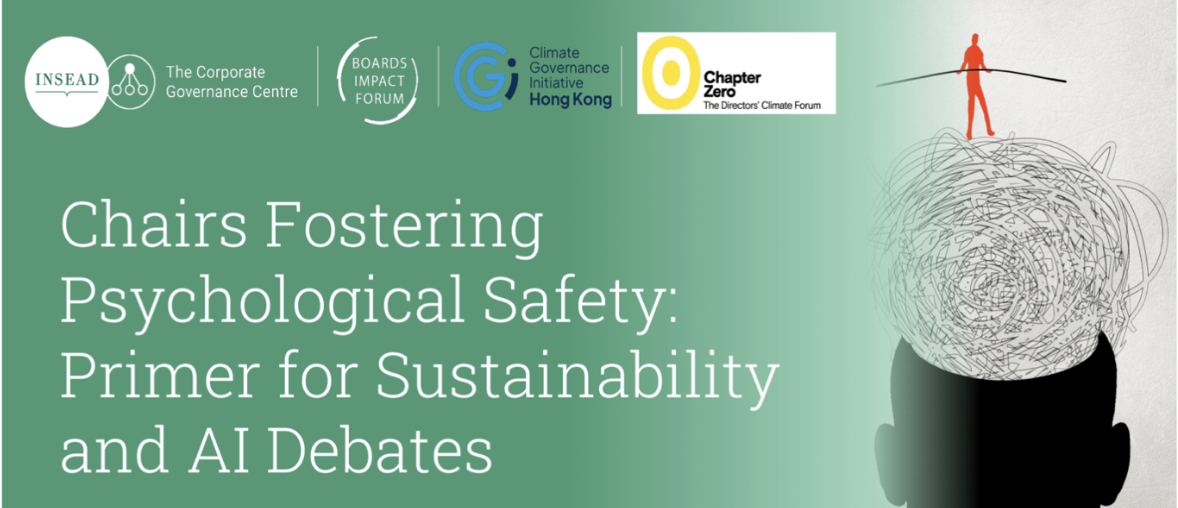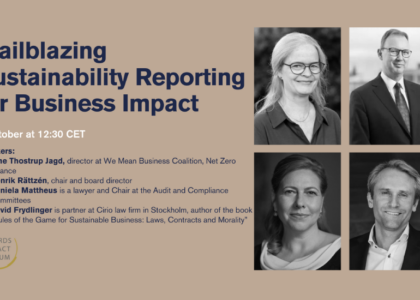In today’s world, marked by heightened environmental consciousness and rapid technological progress, the significance of leadership roles, such as those of Chairs and board members, is increasingly magnified. Their choices not only determine the direction of organizational strategies but also have profound implications for both societal and environmental health.

In late March we hosted a webinar and peer exchange, organized by the INSEAD Corporate Governance Centre, in partnership with the Boards Impact Forum and in collaboration with Chapter Zero UK and the Climate Governance Initiative Hong Kong, explored the myths, misconceptions surrounding psychological safety, and underscored the essential role Chairs play in ensuring board members feel confident to question, challenge, and rethink the conventional.
Table of Contents
Framing Presentation on Psychologial Safety

INSEAD Professor Stanislav Shekshnia (Senior Affiliate Professor of Entrepreneurship and Family Enterprise at INSEAD and Co-Director of the Leading from the Chair program) offered insightful perspectives on Psychological Safety in the boardroom and Chairs role;
Psychological safety, as defined during the event, refers to a team’s confidence that speaking up will not lead to embarrassment, rejection, or punishment. It signifies a team climate marked by interpersonal trust and mutual respect, allowing individuals to be themselves without fear.
The significance of psychological safety for boards cannot be overstated. It fosters inclusivity, exploration, experimentation, support, and fairness, leading to better decision-making, enhanced creativity and innovation, learning and growth, resilience, and higher engagement and satisfaction among directors.
However, there exists a paradox where directors acknowledge the importance of psychological safety yet expect it to be provided to them rather than actively contributing to its cultivation. It’s essential to recognize that board psychological safety is a collective effort, shaped by the relationships and contributions of each director.

Chairs play a pivotal role in enabling boards to embrace responsibility for establishing and maintaining psychological safety. They can achieve this through various strategies:
1. Setting the Stage: Chairs can introduce the concept of psychological safety during onboarding interviews, initiate board discussions, formalize behavioral norms, organize workshops, and integrate training programs.
2. Role Modeling: Chairs should demonstrate empathetic listening, avoid quick judgments, limit their airtime, and be transparent about their knowledge gaps and mistakes.
3. Establishing a Fair Board Process: This involves enforcing rules that promote psychological safety, such as equal airtime, welcoming and respecting all opinions, viewing failures as learning opportunities, and employing diverse discussion models.
4. Promoting a Culture of Psychological Safety: Chairs can reinforce board rules, involve the entire board in discussions about deviant behaviors, express gratitude, offer coaching, and prioritize psychological safety in board evaluations.
Finally, Chairs must ensure the board remains focused, avoiding pitfalls such as pursuing psychological safety for its own sake or using it as an excuse to evade individual accountability. They should continuously remind the board of its purpose and frame psychological safety as a crucial facilitator of its objectives.
Panel Discussion and Experience Sharing

A distinguished panel of Board Chairs offered their respective perspectives including
- Nicholas Allen (Chair & Non-Executive Director (NED) at Link Asset Management Limited, NED at HKEX, The London Metal Exchange, LME Clear Limited, Mordril Properties Limited, and CLP Holdings Limited.),
- Katarina Bonde (Chair of the board at Stillfront Group, Mentimeter AB, Zimpler AB, Stratsys AB, Director of the Board at Mycronic AB, Bure ACQ.), and
- Rolf Pfeiffer (Fellow of the Institute of Coaching (IOC), Harvard, and Co-Host of the IOC EMEA Roundtable. Chair of the Board of Commonpurpose Germany and Vice-Chair of the Foundation of the British Chamber of Commerce in Germany).
The panel of experienced chairs provided valuable insights including
Ensure Active Encouragement of Curiosity
Arranging ad hoc meetings and one-on-one sessions outside of the board room for members to express views on new topics, as AI and Sustainability. Ensure active encouragement of curiosity and of questioning the status quo by the board
“I have a big expectation of how curious board members are in what they do” – Nicolas Allen
“We start board meetings with an open sharing in just 10 minutes. Has anyone heard anything going on in the industry? Any gossip about competition or partners of ours or new things happening in the industry?” – Katarina Bonde
Ensure Safe space on Impactful Topics
Ensuring a safe space and time for getting to know eachother in social settings, and ensuring discussions on impactful topics like AI and sustainability.
“I do find that as one moves along a continuum of gender diversity, you get a much richer discussion and similarly on geographical diversity or background diversity” – Nicolas Allen
“We need to be aware of the fact that when discussions happens in English, native speakers have a natural advantage over non native speakers.” – Rolf Pfeiffer
“I like start the year with a both an open discussion on what should we include besides our annual cadence, and
then I also use a tool like Mentimeter so that all voices can be heard and we prioritize jointly” – Katarina Bonde, Chair
Ensure board training on new topics
Ensuring training in new topics as AI and Sustainability
“If you want to make progress in issues as complex a as AI, you have to face the reality and you have to acknowledge the lack of knowledge. And then collectively (in the board), you should decide how do we work about closing this gap.” – Stanislav Shekshnia
“When sustainability measuring was new, we did a lot of training. I think it’s important to separate out training from actual board meetings.” – Katarina Bonde
“In the world of zoom that we live in, you have the ability to bring in expertise to speak to the board on subjects outside the general cadence of board meetings” – Nicholas Allen
Additionally, insights were gleaned from breakout room discussions where the audience addressed questions on how to expedite discussions about sustainability and AI while ensuring psychological safety.
Closing Remarks
Stanislav Shekshnia provided closing remarks, synthesizing the insights shared during the breakout sessions and offering further reflections on the importance of fostering psychological safety in addressing complex topics like sustainability and AI.
“Psychological safety is not the goal in itself. The psychological safety is there to help boards to deal with the very complex problems like sustainability and AI. Every board should have its own conversation about psychological safety. What do we understand by psychological safety? Why psychological safety is important for us? And how do we want to promote psychological safety? To which extent?” – Stainslav Shekshnia
The event was introduced by Fernanda Torre, Operations Director at Boards Impact Forum and moderated by Liselotte Engstam, Chair of Boards Impact Forum, and Board Member at Climate Governance Initative in collaboration with World Economic Forum.

During the moderation facts was drawn from the survey on the topic, and we still invite board members to contribute to the survey; (Click here to access the SURVEY LINK.)
Learn more:
Listen to the recording format he event
And find the presentation shared at the event
Events and Insights from the participating board networks;
INSEAD Corporate Governance Center
Climate Governance Initiative Hong Kong
Upcoming Events:


For the below event, please join our academic research and answer the survey on boards use of AI, and get more insight and a future report; ;
About Board AI Progress (approx. 11 min)
About Boards Impact Forum
For board members – join Boards Impact Forum (free of charge for Board Members) and help support and partner with our important initiative, read more here
You can also sign up for a prompt of the start of the next Boards Oversight of Sustainability program here A prompt of the start of the next Boards Sustainability program, the next Boards oversight of Responsible AI program here A prompt of the start of the next Boards AI program .
Events arranged by Boards Impact Forum in collaboration with World Economic Forum (Non-Profit Board Network, partnering with Board Networks, INSEAD Corporate Governance Centre, Digoshen , and Next Agents ).








Recent Comments